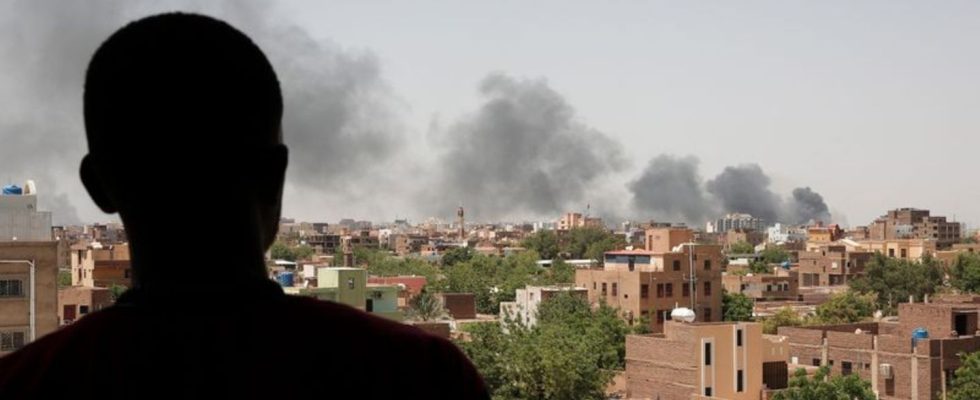conflicts
Africa’s heritage? A continent that never rests
A man looks out over the city of Khartoum where black smoke is rising. The parties to the conflict in Sudan have been fighting each other for more than four months now. photo
© Marwan Ali/AP
The conflict in Sudan enters its fifth month. A coup in Niger threatens to further destabilize the Sahel. Numerous other conflicts smolder on the continent. Why isn’t Africa calming down?
For four months, two former allied generals have been fighting for power in Sudan, regardless of the casualties. A good 4,000 kilometers further west, in the Sahel, battles are raging against Islamist terrorists. With the recent coup in Niger, another country falls into the hands of the military. The conflict could destabilize the entire region. Also in other parts Terrorism and violence are almost part of everyday life in Africa.
Always terrible news. Why isn’t the continent calming down? More than 1.4 billion people live on the second largest continent, more than a billion of them south of the Sahara. About 70 percent of them are younger than 30 years. It is estimated that by 2050 a quarter of humanity will live here.
This is Africa’s chance for increased productivity; the opportunity to develop into an important sales market and to attract investments. Dynamic metropolises such as Luanda, Kigali, Lagos and Nairobi are already making the clichés of the suffering continent fade, even if the city centers are still surrounded by slums. A digital economy is developing in these cities, well-educated young people live, small and medium-sized businesses are growing, and innovation is flourishing.
What conflicts are there in Africa?
And then there’s the other side. According to UN estimates, 44 million people will be fleeing south of the Sahara this year, driven out by violence, hunger or catastrophes. According to the Global Peace Index 2022, five of the ten least peaceful countries in the world are in this region. Human Rights Watch counted more than 15 conflicts in sub-Saharan Africa in which civilians suffered violence this year alone. Some of them:
Sudan: Heavy fighting has broken out between the army and rival RSF militia since April 15. In addition to the capital, the fighting is mainly concentrated in the western region of Darfur, where, according to UN reports, ethnically motivated war crimes are said to have taken place. Western Sahel: Islamist terrorist groups that have sworn allegiance to the Islamic State terrorist militia or the al-Qaeda terrorist network have been using violence in Mali, Niger and Burkina Faso since 2012. After coups d’etat, the military is now in power in Niger, Mali, Burkina Faso, Guinea and Chad. Ethiopia: After years of civil war in the northern Tigray region, violence between the central government and the Amhara ethnic group escalated in the Amhara region, which borders Tigray in the south. Democratic Republic of the Congo: In the east, where there are large deposits of copper, diamonds, cobalt, coltan and gold, rebel groups have been launching attacks for decades. After all, whoever controls the region benefits from the mineral resources. Mozambique: In northern Mozambique – a region in which the French energy company Total is involved in a billion-dollar liquefied gas project – Islamist rebels have been carrying out attacks since 2017. Nigeria: Africa’s largest economy is fighting on multiple fronts: criminal gangs in the north-west, the terrorist militia Boko Haram in the north-east, violent land struggles between herdsmen and tillers in the center, and violence in the south that has flared up again and again for control of oil fields.Somalia: Since For more than ten years, the terrorist militia Al-Shabaab has been destabilizing the country on the Horn of Africa and controls large parts of the south of the country.
The reasons for the conflicts are complex. According to experts, the complex causes include far-reaching political and economic failure, poverty and unemployment, corrupt elites, weak government and dependence on commodity exports. The important domestic political role of the military is also a decisive factor in many states.
The legacy of colonialism weighs heavily on Africa’s shoulders. “In today’s multipolar (dis)order, both Western powers (the United States and France) and emerging powers (China, Russia and Turkey) are intervening in the region to pursue divergent and often conflicting interests,” write analysts at the International Institute for Strategic Studies (IISS) in South Africa. According to the IISS, even during the colonial era, major powers with interests in Africa purposefully supported rival conflicting parties in order to deepen internal fault lines and escalate violence.
The climate crisis is hitting Africa harder and harder
The climate crisis is putting increasing pressure on Africa. Extreme weather events such as drought, floods, tropical storms and plagues of locusts are part of everyday life. People die, have to flee, lose everything. “The potential of climate change to exacerbate violent conflict in Africa is evident,” says Philip Osano, director of the Africa Center at the Stockholm Environment Institute (SEI). The increasing struggle for natural resources will further increase existing tensions, Osano said.
How could there be more calm in Africa? You have to identify recurring causes instead of fighting symptoms, says Raymond Gilpin, an analyst at the think tank Africa Centre. The causes included, for example, control over natural resources, neo-colonial striving for power, crime and terrorism, but also external troublemakers such as the Russian mercenary group Wagner. Attempts to quell violence through counterinsurgency, economic sanctions or quick new elections are often counterproductive, Gilpin warns: “Much more can be achieved with comprehensive, long-term approaches.”

